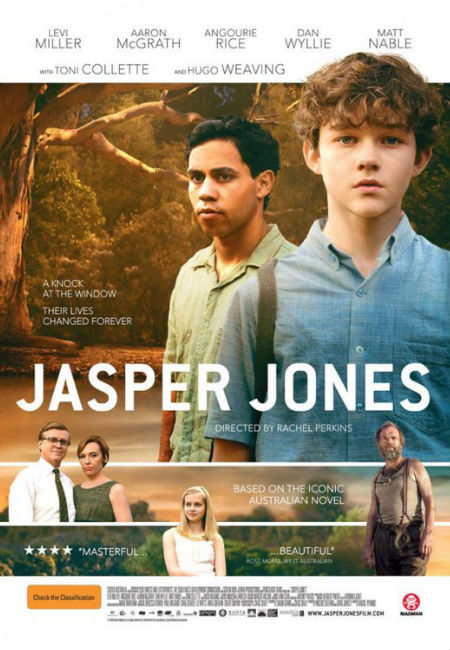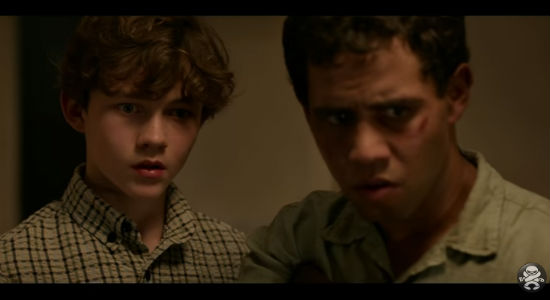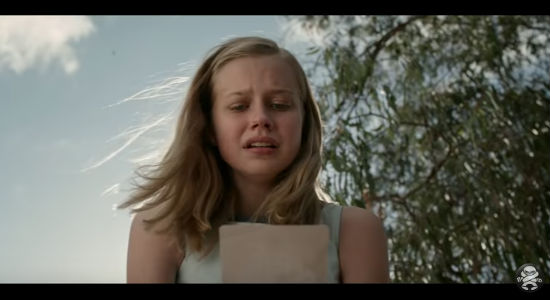
There is always a fraught element to any book-to-film adaptation – will the movie do its literary antecedent justice? – one made all the more pronounced when the book is as well-loved, and highly-praised as Craig Silvey’s instant Australian classic, Jasper Jones (2009).
One way around this wellspring of trepidation is to co-opt the author, if they are willing, to contribute to the screenplay in the hopes that the magic they brought to the book can effortlessly transfer across to the film.
In the case of Jasper Jones, that type of partnership is exactly what transpired with Silvery sharing writing credits with Shaun Grant; quite whether the magic made its journey from page to screen is a matter for some credit.
On the surface at least, and right through to its undeniably strong and beating heart, one given greater emotional resonance by an exceptional performance by Levi Miller as Charlie and Aaron L. McGrath as the titular Jasper, the film, set in 1969, knocks its right out of the park (or the oval with cricket featuring as the sport du jour and a metaphor for racial integration or lack thereof).
Along with the strong performances from the two leads, particularly Miller whose body seem to physically shrink or grow depending on his character’s emotional state at the time, Angourie Rice is moodily perfect as Eliza, the sister of the dead girl (Laura) at the centre of the murder mystery that ostensibly forms the spine of the narrative, while Hugo Weaving is a world unto himself as Mad Jack Lionel, a man who Charlie and Jasper suspect is behind the supposed murder.
So part murder mystery, part rumination on race relations and part microscopic examination of the sometimes suffocating idiosyncrasies of small town life, Jasper Jones, by all accounts (I have not read the book) brings many of the book’s themes to vivid life.

It is especially effective in vividly drawing us a picture of small town life in which bookish Charlie, outcast Jasper and precocious Eliza don’t really fit on, each in their own way a hostage to a homogenity that is not their own and never will be.
The same applies to Charlie’s mother Ruth (Toni Collette) who is palpably unhappy in her marriage, though she is still claims to love her husband Wes (Dan Wyllie), an aspiring author, and a cat-on-a-hot-tin-roof mother who loves her son but is often prickly and harsh in her treatment of him.
In that sense Jasper Jones sings the song of the Other, those people who by fate or circumstance find themselves in a world they neither identify with nor truly belong to; that kinship is best articulated when Jasper, panicked by the fact that Laura’s body is swinging from a tree at his hang-out place by a billabong (natural pond) effectively rendering him as the main suspect, tells Charlie that he picked him to share his secret because he is an outsider and he’s smart.
The hunt for Laura’s killer is a shared experience for Jasper and Charlie who almost immediately suspect another significant Other, Mad Jack, of being the one responsible, based solely on stories that tell of him murdering a woman at the abattoir at which he worked just after World War Two.
Of course it’s not that straightforward and on their way to uncovering the truth, which they do not manage, more by luck than good detective work, a great many other secrets are uncovered in a town that seems well adept at keeping them.
It’s these secrets, many of which have micro subplots of their own that end up rendering Jasper Jones as a fractured film that fails to fully coalesce its many disparate narrative strands.
While it’s emotional heart is undisputed, its dissipates much of its impact by failing to fully pull the many dangling storyline threads together in a way that truly satisfies.

It’s a not a ruinous failing by any measure, and the film remains a compelling watch by any standards, but it failure to realise a coherent narrative means that the many issues upon which it is commenting such as race relations, marital infidelity, coming of age dramas, dysfunctional family dynamics and the role of the outsider, never truly gel.
Consequently, the film gets to its final scenes, and it’s as if Rachel Perkins admits defeat by tacking on a montage that is, you have to assume, supposed to be a neat wrapping up of the story.
Unfortunately many of the enticing narrative elements that make the film such a delightful watch in many respects such as Charlie’s ongoing debate with best friend Jeffrey (Kevin Long) about whether Batman or Superman is the greater superhero, never actually go anywhere.
Even the wrapping up of the murder mystery doesn’t really go anywhere although there is a satisfying emotional closing out of the family dynamics that led to it, a rare moment of a definitive ending of sorts to a narrative thread.
On the whole Jasper Jones is a good movie, one that neatly captures what small town life is like and how the bucolic atmosphere that adorns its surface is not always matched by the darkness further down, but it fails to become truly great or as much of a classic as it might have been thanks to its scattered narrative structure.
By all means go and watch it and revel in some truly great performances, cuttingly incisive social observations and deep emotional resonance, but ponder too what might have been if the screenplay had applied the same rigour to its storytelling as, by all accounts, the book did.